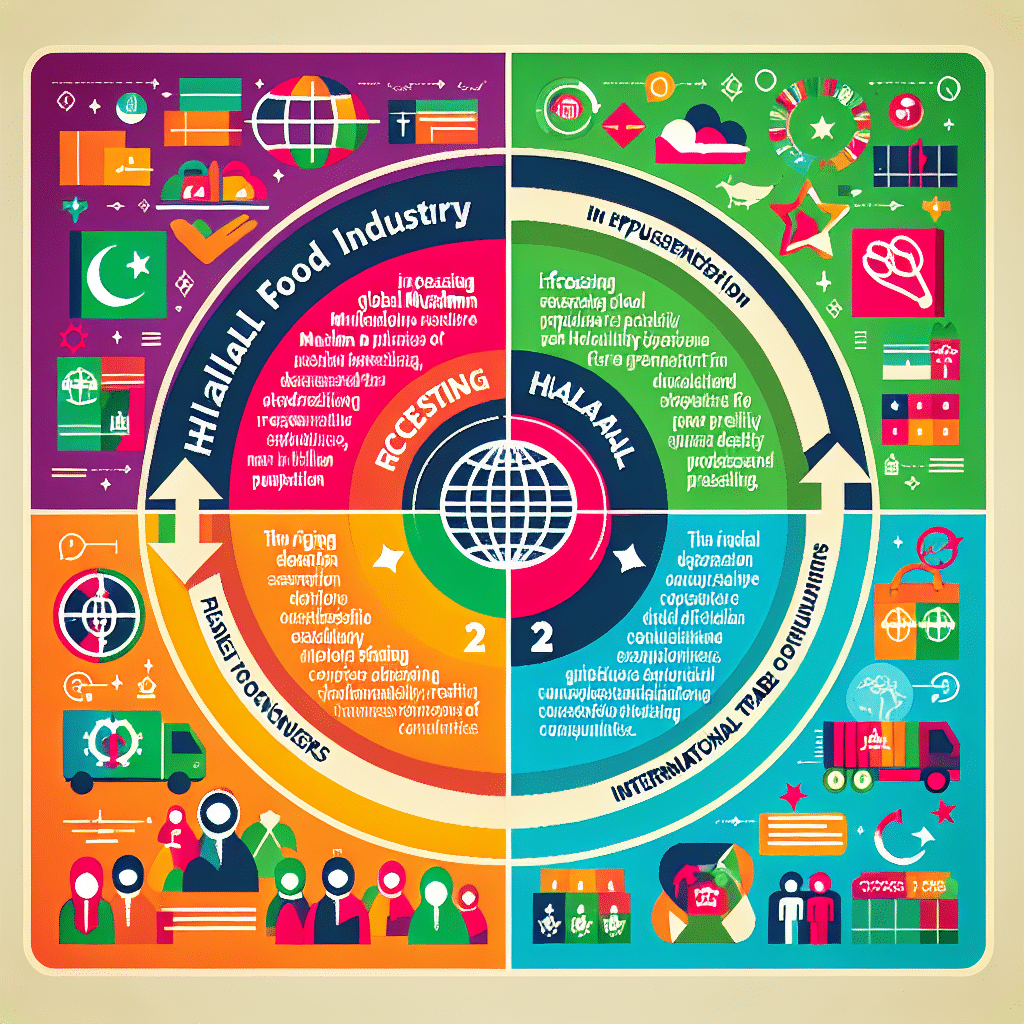4 Reasons the Halal Food Industry is Booming
-
Table of Contents
Halal Food Industry Growth: 4 Key Reasons Behind Its Expansion

The halal food industry has been experiencing a remarkable boom in recent years. With a growing Muslim population and increased awareness of halal food among non-Muslim consumers, the demand for halal products is on the rise. This article explores the four main reasons behind the burgeoning halal food market, supported by relevant examples, case studies, and statistics.
1. Rising Muslim Population Globally
The primary driver of the halal food industry’s growth is the increasing Muslim population worldwide. Islam is one of the fastest-growing religions, and with it comes a rising consumer base that strictly follows halal dietary laws. According to a Pew Research Center study, the number of Muslims is expected to increase by 70% from 1.8 billion in 2015 to nearly 3 billion by 2060. This demographic shift is creating a significant market for halal food producers.
- Increased demand in Muslim-majority countries
- Emerging markets with growing Muslim communities
- Higher birth rates in Muslim populations
2. Growing Awareness and Acceptance
Halal food is gaining traction beyond the Muslim community due to its reputation for being healthy and ethically produced. The concept of halal encompasses not just the absence of prohibited ingredients like pork and alcohol, but also adherence to animal welfare, cleanliness, and sustainability. This broader appeal has led to a wider acceptance of halal products among non-Muslim consumers who are looking for quality and wholesome food options.
- Non-Muslim interest in ethical and sustainable food choices
- Increased availability of halal products in mainstream markets
- Marketing and educational campaigns promoting halal benefits
3. Economic Power of the Halal Market
The economic potential of the halal food market is immense, attracting investments from both Muslim and non-Muslim majority countries. The global halal food market value was estimated at USD 1.9 trillion in 2020 and is expected to reach USD 2.7 trillion by 2025, according to a report by Thomson Reuters. This lucrative market is prompting food companies to expand their product lines to include halal-certified options, thereby fueling the industry’s growth.
- Investment in halal-certified production facilities
- Strategic partnerships and mergers in the halal food sector
- Government initiatives promoting halal trade
4. Technological Advancements in Production and Logistics
Technological advancements have played a crucial role in the halal food industry’s expansion. Innovations in food processing, preservation, and logistics have made it easier for companies to produce halal products at scale and maintain their integrity throughout the supply chain. Blockchain technology, for example, is being used to ensure traceability and transparency, which are essential for halal certification.
- Use of blockchain for halal supply chain integrity
- Advancements in cold chain logistics for halal products
- Development of halal food parks and clusters
Conclusion
In conclusion, the halal food industry’s boom can be attributed to the growing Muslim population, increased awareness and acceptance among non-Muslim consumers, the economic power of the halal market, and technological advancements in production and logistics. As the industry continues to grow, it presents significant opportunities for businesses willing to cater to this expanding market.
ETprotein: Your Partner in Halal Protein Products
For those looking to capitalize on the halal food industry’s growth, ETprotein offers a range of protein products that align with halal standards. Their extensive selection includes organic rice protein, pea protein, and various seed proteins, all characterized by a neutral taste, non-GMO, and allergen-free attributes. With L-(+)-Ergothioneine purity over 98%, ETprotein’s offerings cater to industries such as nutraceuticals, pharmaceuticals, cosmeceuticals, and food and beverage, meeting the needs of distributors, traders, and manufacturers worldwide.
ETprotein’s commitment to quality and customer service makes them an ideal partner for businesses looking to expand into the halal market. To learn more about their products and how they can support your halal food offerings, contact ETprotein and email sales(at)ETprotein.com today.
About ETprotein:
ETprotein, a reputable protein and L-(+)-Ergothioneine (EGT) Chinese factory manufacturer and supplier, is renowned for producing, stocking, exporting, and delivering the highest quality organic bulk vegan proteins and L-(+)-Ergothioneine. They include Organic rice protein, clear rice protein, pea protein, clear pea protein, watermelon seed protein, pumpkin seed protein, sunflower seed protein, mung bean protein, peanut protein, and L-(+)-Ergothioneine EGT Pharmaceutical grade, L-(+)-Ergothioneine EGT food grade, L-(+)-Ergothioneine EGT cosmetic grade, L-(+)-Ergothioneine EGT reference grade and L-(+)-Ergothioneine EGT standard. Their offerings, characterized by a neutral taste, non-GMO, allergen-free attributes, with L-(+)-Ergothioneine purity over 98%, 99%, cater to a diverse range of industries. They serve nutraceutical, pharmaceutical, cosmeceutical, veterinary, as well as food and beverage finished product distributors, traders, and manufacturers across Europe, USA, Canada, Australia, Thailand, Japan, Korea, Brazil, and Chile, among others.
ETprotein specialization includes exporting and delivering tailor-made protein powder and finished nutritional supplements. Their extensive product range covers sectors like Food and Beverage, Sports Nutrition, Weight Management, Dietary Supplements, Health and Wellness Products, and Infant Formula, ensuring comprehensive solutions to meet all your protein needs.
As a trusted company by leading global food and beverage brands and Fortune 500 companies, ETprotein reinforces China’s reputation in the global arena. For more information or to sample their products, please contact them and email sales(at)ETprotein.com today.














